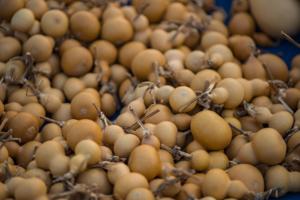Why My Tomato Plants Have Flowers but No Fruit
Tomatoes are one of the most popular plants to grow in a home garden. They are relatively easy to care for and provide a bountiful harvest of juicy, flavorful fruits. However, sometimes tomato plants can produce flowers but no fruit, leaving gardeners puzzled and frustrated. In this article, we will explore some of the most common reasons why tomato plants may have flowers but no fruits.
Environmental Factors
The first and most important factor that affects the fruiting of tomato plants is the environment. Tomatoes need plenty of sunshine, warmth, and water to thrive. If your tomato plants are not receiving enough sunlight or are growing in a cold or wet spot, they will not produce fruits. Make sure your plants get at least six hours of direct sunlight every day and that the soil is warm and well-draining.
In addition, tomato plants require adequate nutrition to produce healthy fruits. A lack of nutrients in the soil can cause plants to produce flowers without setting fruit. Make sure you are using a high-quality fertilizer that is designed for tomatoes and that your soil has enough organic matter to provide the necessary nutrients.
Pollination Issues
Another common reason why tomato plants may not produce fruits is pollination problems. Tomatoes are self-pollinating plants, meaning they do not rely on bees or other insects for pollination. However, if the weather is too wet or too dry, the flowers may fail to set fruit. If you suspect that your tomato plants are not being pollinated properly, you can try shaking the plants gently or brushing the flowers with a small paintbrush to simulate pollination.
Disease and Pest Problems
In some cases, tomato plants may produce flowers but no fruit due to disease or pest problems. Diseases like blossom end rot can cause the fruits to become misshapen or rot before they mature, and pests like aphids or whiteflies can suck the nutrients from the plant, preventing it from producing fruit. Regularly check your plants for signs of disease or pests and take appropriate measures to control them.
Conclusion
In conclusion, there are many reasons why tomato plants may produce flowers but no fruit. The environment, pollination issues, disease, and pests are some of the most common factors that affect the fruiting of tomatoes. By providing your plants with proper care, nutrition, and attention, you can ensure that they will produce a bountiful harvest of delicious fruits.

 how many times do yo...
how many times do yo... how many planted tre...
how many planted tre... how many pine trees ...
how many pine trees ... how many pecan trees...
how many pecan trees... how many plants comp...
how many plants comp... how many plants can ...
how many plants can ... how many plants and ...
how many plants and ... how many pepper plan...
how many pepper plan...
































